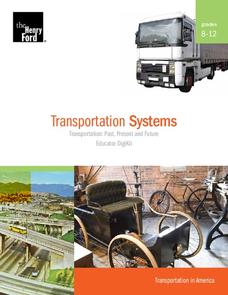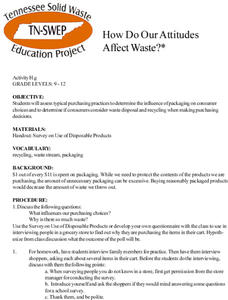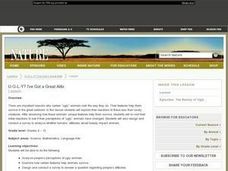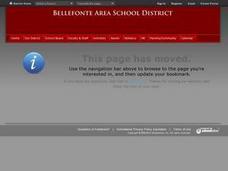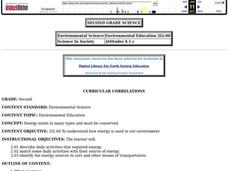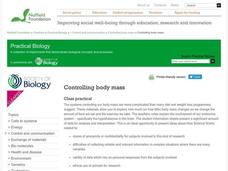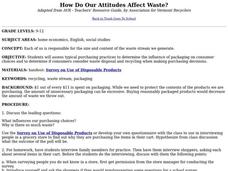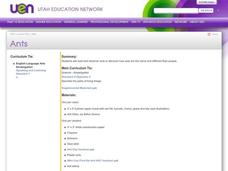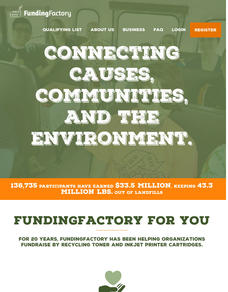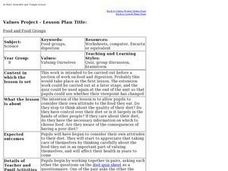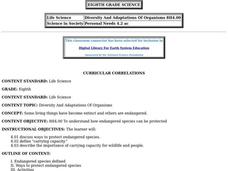Henry Ford Museum
Transportation Systems
Learners analyze the evolution of cultural attitudes through the lens of transportation, examining several artifacts, documents, and photographs. Topics covered include how American attitudes have influenced society's evolution into a...
Curated OER
How Do Our Attitudes Affect Waste?
Students conduct a survey of society's typical purchasing practices to determine the influence of packaging on consumer choices and to determine if consumers consider waste disposal and recycling when making purchasing decisions.
Wilderness Classroom
Pollution
Educate scholars on pollution—air, water, and land—with a series of lessons that begin with a thorough explanation of each type. Learners then take part in three activities to reinforce the importance of reducing pollution. They...
Curated OER
Recycling Attitudes Survey
Students create and administer surveys to provide information about attitudes toward recycling. Each student administers a class-created survey to at least four different individuals. As a class, students analyze their findings and...
Curated OER
Recycling Survey
How many people really recycle recyclables and how do they feel about it? High schoolers create a survey to find out. Once they agree on what questions to include, they each interview four people outside of the classroom....
Curated OER
U-G-L-Y? I've Got a Great Alibi
Students create a survey to explore people's perception of beauty. In this biology instructional activity, students explain how an animal's appearance helps it survive. They analyze survey results and present findings in class.
Curated OER
Pollution Search
First graders identify forms of pollution and describe effects that various pollutants can have on people, wildlife, and plants; students describe relationships between various forms of pollution and human actions.
Curated OER
Environmental Education
Second graders discuss the different forms of energy and their sources. They work with a partner to answer a variety of questions revolving around energy. They develop a scientific attitude about renewable energy.
Curated OER
Animals in Sports and Entertainment
Students explore how people's views on animal treatments differ. In this animal treatment and attitudes lesson, students review cases on animal treatment and evaluate whether or not the case was animal cruelty. Students understand...
Curated OER
TE Lesson: I've Gotta Get Some Air
Learners investigate types and sources of indoor air pollutions both at home and in school. They decide on how to prevent poor indoor air quality. They debate smoking in order to determine how language usage can be an influence in...
Curated OER
To Eat or Not to Eat?
Learners identify various parts of plants and determine which parts people eat. They conduct a celery stalk experiment in which they determine the value and use of the stem, and how it helps the plant to meet its needs. Students use a...
Nuffield Foundation
Controlling Body Mass
Many variables impact your body mass, not just diet and exercise. Scholars collect and study data about body mass to better understand the complexity of a sensitive topic. They learn about leptin deficiency, the hypothalamus, and more.
Curated OER
Mother Earth Connection: Earth Day
Students read Brother Eagle, Sister Sky to appreciate the attitudes of the Native Americans to "Mother Earth." In this environmental lesson plan, students review vocabulary environmentalism. Students compare mother Earth to mother....
Curated OER
How Do Our Attitudes Affect Waste?
Students take a survey to assess typical purchasing practices, to determine the influence of packaging on consumer choices. They also determine whether consumers consider waste disposal and recycling when making purchasing decisions.
Curated OER
Predator-Prey Relationships
Students explore the interrelatedness of predators and prey in four different activities. They simulate an aquatic insect, fish, and osprey food chain during a poker chip game, play an M&M game to simulate the relationship between...
Curated OER
Getting to Know You: Meal Worms
Students recognize differences between themselves and other people, and accept their uniqueness as a positive gift, by studying meal worms.
Curated OER
Too Bright at Night?
Learners explore the consequences of light pollution. They consider benefits and drawbacks of technology in order to acquire informed attitudes on the various technologies and their social, cultural, economic, and ecological consequences. .
Curated OER
Ants
Students listen to the story Ant Cities by Arthur Dorros, and discuss the ways that ants are similar to people. They create a butcher paper mural of an ant colony that includes hills, tunnels, rooms, grass and sky.
Curated OER
The Aerial Age
Students infer America's attitude towards aviation in the early 1900s. In this The Aerial Age lesson, students analyze early 1900s literature, music, advertisements, and popular culture in reference to aviation. Students represent their...
Curated OER
Stereotype & Bias
Students examine the way that the media perpetrates stereotypes. In this stereotyping lesson students complete several activities on stereotyping.
Curated OER
Recycling Survey
Students create and administer surveys to provide information about attitudes toward recycling. Each student administers a class-created survey to at least four different individuals. As a class, students analyze their findings and...
Curated OER
Food and Food Groups
Eighth graders research the importance of diet and its relationship to disease. They examine their own attitudes about the foods they eat.
Curated OER
Science Week 2006
Students read these news reports: Science is hard and dull says kids, and PM behind Science Week campaign. They then discuss that the news stories show two sides of the public image of science in the UK. The teacher explains that...
Curated OER
Diversity and Adaptations of Organisms
Eighth graders discuss ways in which to protect endangered species. They examine the concept of carrying capacity. They discuss the importance of carrying capacity for wildlife and people.
